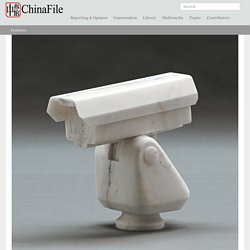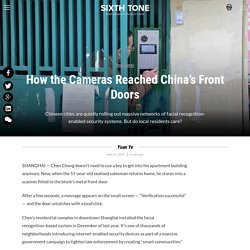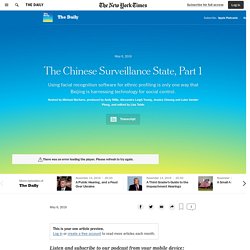

A Smart Lamp That Watches Kids When They Study Is a Hit in China. China Set to Pass One of the World’s Strictest Data-Privacy Laws. HONG KONG—The world’s leading practitioner of state surveillance is set to usher in a far-reaching new privacy regime.

China’s top legislative body is expected this week to pass a privacy law that resembles the world’s most robust framework for online privacy protections, Europe’s General Data Protection Regulation. But unlike European governments, which themselves face more public pressure over data collection, Beijing is expected to maintain broad access to data under the new Personal Information Protection Law. The national privacy law, China’s first, is being reviewed as frustration grows within the government, and in Chinese society at large, over online fraud, data theft and data collection by Chinese technology giants. The law is on its third round of reviews, usually the last before passage. The law will require any organization or individual handling Chinese citizens’ personal data to minimize data collection and to obtain prior consent, according to the latest published draft.
Lao Dongyan, "Artificial Intelligence" - Reading the China Dream. How to Evade Big Brother: An Artist’s Guide. Anyone who happened to be strolling through central Beijing on the afternoon of Oct. 26 may have spotted a peculiar sight.

Around 10 people, all donning high-visibility vests, zigzagged their way down a busy street while crouching, creeping along walls, and leaning in bizarre angles as they went. The scene wasn’t a training day for aspiring secret agents; it was part of “A Disappeared Movement” — a performance art project that’s teaching local residents how to evade the country’s rapidly expanding surveillance network. Devised by the artist Deng Yufeng, the project aims to make people aware of how closely they’re being watched by showing them just how difficult it is to remain unseen. China’s invasive surveillance state is not yet a panopticon.
State of Surveillance. High atop Mount Xiqiao, an extinct volcano that soars above the Pearl River Delta, a towering statue of the Buddhist goddess Guanyin gazes down on the concrete sprawl of the city of Foshan.

Inside the NSA’s Secret Tool for Mapping Your Social Network. 2020 SFRC Minority Staff Report The New Big Brother China and Digital Authoritarianism. City’s Plan for Permanent ‘Health Codes’ Sparks Online Backlash. Authorities in the eastern Chinese city of Hangzhou have announced plans to launch a health-tracking QR code for monitoring people’s health status at all times — regardless of whether there is a public health emergency.

According to an official announcement reported by local media, the code would be displayed as a color and a numerical score out of 100, based on individuals’ medical records, physical exam results, and lifestyle choices such as smoking and general activity level. The project represents an expansion of China’s current virtual health passport system, which was introduced nationwide in February to monitor and control the spread of the coronavirus.
Local officials have worked with smartphone apps such as Alipay and WeChat, the country’s two ubiquitous mobile payment platforms, to develop the system. Based on an individual’s travel history and health status, the apps would assign them a color code — green, yellow, or red — to indicate their contagion risk. Editor: David Paulk. How the Cameras Reached China’s Front Doors. SHANGHAI — Chen Chong doesn’t need to use a key to get into his apartment building anymore.

Asia In-Depth Podcast: Is Chinese-Style Surveillance the Future? Subscribe in iTunes ∙ RSS Feed ∙ Download ∙ Full Episode Archive Less than a decade ago, amid the drama of the Arab Spring, it was fashionable to predict that technology would fatally weaken authoritarian governments around the world.

These views now seem hopelessly outdated — and nowhere is this more the case than in China. There, the ruling Communist Party has subjected the Muslim population of Xinjiang to severe restrictions and an extraordinary degree of high-tech surveillance. NPR Choice page. A Surveillance Net Blankets China’s Cities, Giving Police Vast Powers. Recognize this guy?

How about this one? Him? They all have something in common. They govern like autocrats. The Chinese Surveillance State, Part 1. Michael barbaro From The New York Times, I’m Michael Barbaro.

This is “The Daily.” Today: Under Xi Jinping, China is pioneering a new form of governance by surveillance. In the first of a two-part series, my colleague Paul Mozur on how China piloted that system on one minority group in the country. It’s Monday, May 6. Professors, Beware. In China, Student Spies Might Be Watching.
CHENGDU, China — With a neon-red backpack and white Adidas shoes, he looks like any other undergraduate on the campus of Sichuan University in southwestern China.

But Peng Wei, a 21-year-old chemistry major, has a special mission: He is both student and spy. Mr. Peng is one of a growing number of “student information officers” who keep tabs on their professors’ ideological views. They are there to help root out teachers who show any sign of disloyalty to President Xi Jinping and the ruling Communist Party. World Catching Up With China on Surveillance Tech. China’s ‘data doors’ scoop up information straight from your phone. Facial recognition devices have become ubiquitous across China.

But what you probably didn’t know is that some of these machines can snatch up information straight from your smartphone. While they look like regular metal detectors on the outside, they’re much more than that. Aside from facial recognition and ID card verification, the so-called “three-dimensional portrait and integrated data doors” vacuum up MAC addresses, IMEI numbers and other identifying information from electronic devices. Made in China, Exported to the World: The Surveillance State. C.E.I.E.C. and China’s Ministry of Foreign Affairs did not respond to requests for comment. In a statement, Huawei said: “Huawei provides technology to support smart city and safe city programs across the world.
In each case, Huawei does not get involved in setting public policy in terms of how that technology is used.” In Ecuador, the cameras that are part of ECU-911 hang from poles and rooftops, from the Galápagos Islands to the Amazonian jungle. The system lets the authorities track phones and may soon get facial-recognition capabilities. Recordings allow the police to review and reconstruct past incidents. 171212 China Monitor 44 Programming China EN 0. Scmp. The-police-state-of-the-future-is-already-here# Who needs democracy when you have data? In 1955, science fiction writer Isaac Asimov published a short story about an experiment in “electronic democracy,” in which a single citizen, selected to represent an entire population, responded to questions generated by a computer named Multivac.
The machine took this data and calculated the results of an election that therefore never needed to happen. Subscribe to read. Internet Users in China Expect to Be Tracked. Now, They Want Privacy. Inside China’s Dystopian Dreams: A.I., Shame and Lots of Cameras. Blogging the Slow-Motion Revolution: An Interview with China's Huang Qi. Huang Qi is best known in China as the creator of the country’s first human rights website, Liusi Tianwang, or “June 4 Heavenly Web.” A collection of reports and photos, as well as the occasional first-person account of abuse, the site is updated several times a day. It documents some of the hundreds of protests continually taking place in China, many related to government land seizures. Tech Giants Feel the Squeeze as Xi Jinping Tightens His Grip.
Facial Recognition 面部识别. DNA 鉴定. Artificial Intelligence. Social Credit System 社会信用体系. Surveillance in Xinjiang.